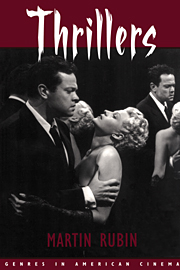Summary
Whereas the classical period of the movie thriller had been characterized by the entrenchment of most of the central thriller genres, the period beginning around 1960 was marked primarily by reconceptions of those genres. Key thriller categories underwent major overhauls, ranging from subversive debunking that virtually closed the door on the genre (the detective film), to neoclassical revival that recontextualized an earlier generic movement (neo-noir), to revitalization that greatly enhanced the popularity of a genre, whether on a short-term basis (the spy film) or a long-term one (the police film, the horror film). Among the factors contributing to these new directions were the decline of the old Hollywood studio system (symbolized by the content-controlling Production Code) and the vogue of imported foreign films, which achieved unprecedented success and influence in the 1950s and 1960s.
European Influences, American Censorship, and Heist Films
The postwar expansion of foreign-film exhibition in the United States popularized a number of highly regarded imported thrillers that provided both an alternative to American thrillers and an influence on their future development. In the early 1950s, this impact was centered largely on the level of subject matter. The content of Hollywood movies was still subject to the Production Code, written in 1930 and effectively enforced since 1934, though its strictures were being increasingly criticized and challenged. The Code's authority had been weakened by the government's severance (announced in 1948 and enforced gradually over the next decade) of the monopolistic link between the Hollywood studios and their theater chains.
- Type
- Chapter
- Information
- Thrillers , pp. 119 - 178Publisher: Cambridge University PressPrint publication year: 1999

